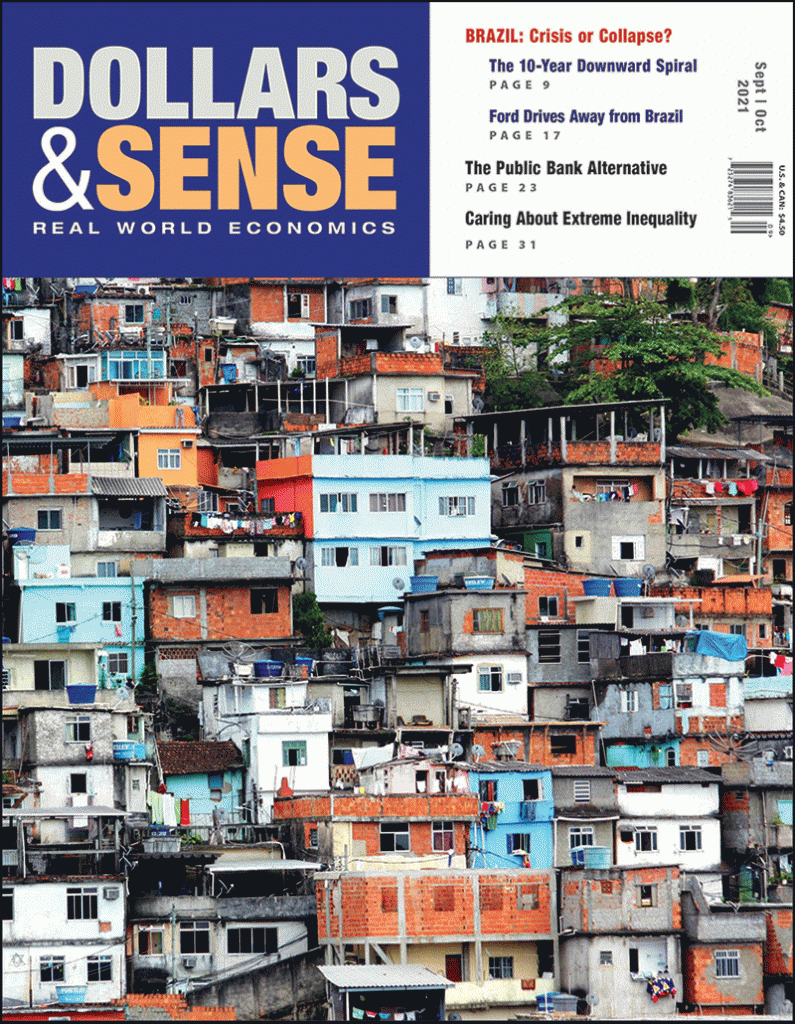Fighting Climate Change in Portlandia
Not only is failure not an option, those fighting to avert cataclysmic climate change have achieved important successes worthy of celebrating.

Our (very late) September/October 2021 issue is finally out! We have joint cover stories on Brazil's economic and political crisis; one of them, by James M. Cypher and Guillermo Foladori, "Brazil's Ten-Year Downward Spiral," is posted here. The issue's table of contents is here. And here is the p. 2 editorial note:
There was talk in early September of an attempted coup in Brazil—or at least some kind of insurrection along the lines of the January 6 U.S. Capitol putsch—when President Jair Bolsonaro called on his supporters to gather, one million strong, at the September 7 Independence Day celebrations in Brasília and march on the Supreme Court. The attempt fell far short, with a crowd of around 100,000 Bolsonaro protesters, and with many more counter-protesters and no breach of the Supreme Court building, according to the website Brasil Wire (brasilwire.com). Our joint cover stories in this issue show why the political and economic situation in Brazil and the fortunes of its president’s regime seem so volatile.
James M. Cypher and Guillermo Foladori trace the 10-year downward spiral of Brazil’s economy from the high point during the pro-poor policies of the Workers’ Party (PT) to the plunge in economic indicators and the ravages of Covid-19 under Bolsonaro. Neoliberal austerity and the power of the oligarchic agricultural lobby are key culprits, along with Bolsonaro’s “[e]rratic, incompetent, and impulsive” leadership. Whether his departures from the advice of his neoliberal economic minister, Paulo Guedes, will stem the downward economic spiral, and whether the ruling-class factions will continue to support him, may determine whether he stays in power—legally or otherwise.
Meanwhile, Débora Nunes tells the story of Ford’s departure from Brazil after more than a century of operation, and what it shows about the multi-sector deindustrialization that the country has undergone. Right-wing commentators want to blame capital flight on the so-called “Brazilian Cost”—the supposed burden of regulations, taxes, high wages, and overly generous benefits. Yet under the post-PT regimes that slashed taxes, regulations, wages, and benefits, deindustrialization accelerated. It seems that whatever its rhetoric about spurring growth, neoliberalism’s main effects are destructive and redistributive—from the bottom to the top.
The themes of growing inequality, concentration of economic power, and right-wing power-grabs will sound familiar to U.S. readers. In this issue, our columnists John Millerand Arthur MacEwan address the inequality and power concentration at the heart of the U.S. economy. Miller covers the recent ProPublica report on tax evasion at the top of the income ladder, and how the unfairness of the tax code, shaped by the very wealthy, allows billionaires to shelter and increase their wealth. MacEwan addresses why people aren’t more upset about the country’s vast inequality, even when they are aware of it. The main problem is the acceptance of the myths of fair markets and social mobility. So beyond raising taxes on the wealthy, we need to debunk these myths, and show people how vast inequality perpetuates the problems they do care about—like our tattered and expensive health care system, climate change, and educational inequality.
Ever-growing inequality has helped consolidate and concentrate corporate control over the U.S. economy. The financial sector is a prime example. This issue’s third feature article, by public banking activist Rick Girling, describes an alternative approach to banking that can “challenge unelected and unaccountable corporate bank executives’ control over the nation’s financial system.”
On Tuesday, October 26 at 8pm EDT, Dollars & Sense will hold a screening and panel discussion of Mary Filippo’s film “My Mis-Education in 3 Graphics.”
The film, which was reviewed by Tim Koechlin in our November/December 2020 issue, “…documents the filmmaker’s darkly humorous journey through the mind-boggling constructs of mainstream economics.” The event will be held online and will include a Q&A session with the filmmaker and panelists.
For more information about the film, visit my-mis-education-in-3-graphics.org. For information about the event and how to attend, visit dollarsandsense.org/mymiseducation.